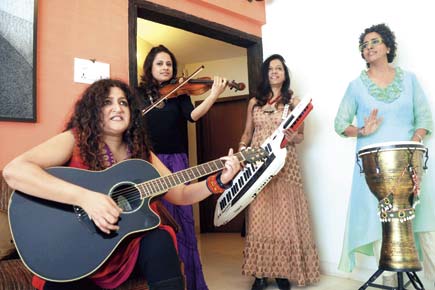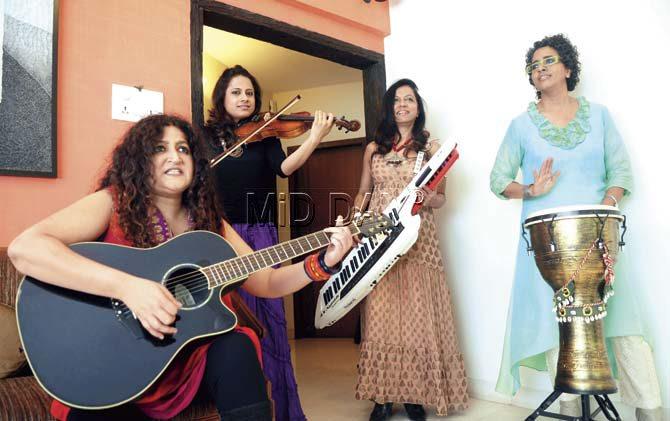Mumbai based all-women band Indiva features four artistes whose sound is a heady mix, ranging from Western Classical, Jazz and World Music to Hindustani Classical

When you walk in to meet the Indiva girls, who are getting ready for an interview and photo shoot, it’s tough to miss the camaraderie. The band comprises of talented, spirited and successful performers: Hamsika Iyer, Merlin D’Souza, Shruti B Padhye and Vivienne Pocha.
ADVERTISEMENT

The Indiva band members (from left to right) Vivienne Pocha, Shruti B Padhye, Merlin D’Souza and Hamsika Iyer during a jam session. Pic/Nimesh Dave
“Merlin and I go back a long way, since we performed together at corporate shows, as well as Jazz, Blues and Fusion concerts, and musicals. Hamsika has collaborated with Merlin on jingles, and also on Bollywood tracks and live shows. Hamsika brought in Shruti and we hit it off,” says Pocha.
“When Merlin and I performed together, we would fuse Indian and Western music; the sound of the band was a progression of that. Hamsika and Shruti are trained Indian Classical singers while Merlin is trained in Western Classical, and I am from the Jazz-Blues genre, so the combination fell in place,” she adds.
“India is full of beautiful, rich Folk traditions; we blend this with World Music,” says Iyer. “We want to compose for Bollywood too, but it should match our sound,” chips in Pocha. “Most girl bands today, are orchestrated. There is a producer who picks and says, ‘Let’s get this one and that one.
They look good.’ They will bring a music director, who will make songs for them; they are packaged and presented. We are serious musicians, in our own trade. We have chosen music as a career, forever, till we die. It makes it easier for us to relate to each other and stay together as opposed to bands that are engineered,” reveals Pocha. “We have been self sufficient so far. We have a composer and arranger amongst us.
When there is a basic idea, Merlin gives life to it in her studio by composing and arranging. So, longevity isn’t a hurdle,” says Padhye. “The challenge, however, is that everyone gets busy with their individual professional commitments. To say no to these offers for Indiva, is tough,” explains D’Souza.
“My parents were relieved that I chose music. They were worried because I was too much into sports,” laughs Iyer. “My parents were trying to arrange my marriage. The lady who could have been my mother-in-law asked me what I do. I told her I was a musician, and I saw her cringe. It was a big black mark against me, for her,” reveals Pocha.
“Many people ask us what we do for a living, after we have told them we are musicians,” says an amused Padhye. “Today, people are more used to seeing women perform. They are also more receptive to new sounds and independent music unlike earlier, when it was either Bollywood or Hindustani Classical,” says Iyer.
“I went to the Alibaug Music Festival recently that featured many women performers. Lots of women are taking up the academics of studying instruments too,” adds Pocha. “Earlier, people were only exposed to what was played on television and radio. Today, there is YouTube too.
This has helped people access independent music,” feels Padhye. “We performed in Lucknow recently. We did two covers; the rest were Folk tunes in different languages, and these were well received. People are keen to know what we do on stage, they listen and appreciate,” she adds. “It’s a big gift to be able to express yourself, we have been lucky.
We want to travel to remote places, and inspire women there to follow their dreams,” says Iyer. “As women, we too still go home, cook, clean and run homes. Women multi-task well,” D’Souza believes. “Since our interview was scheduled, I woke up much earlier and finished my household chores before I came here,” Iyer chips in.
“It’s high time people forget the gender and let women do what they want to do. Follow your dreams. If there is hunger in the belly, you will succeed,” concludes Pocha.
 Subscribe today by clicking the link and stay updated with the latest news!" Click here!
Subscribe today by clicking the link and stay updated with the latest news!" Click here!






